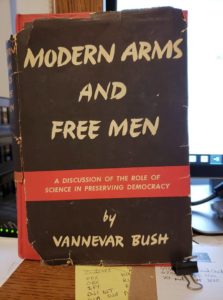Some time ago I made a review about Fletcher Prouty’s book on the JFK assassination. In that I wrote that I was somewhat surprised how Prouty went back in time and spent much of his book talking about events from 1943 up to 1959, before Kennedy was in the presidency. After reading that, I wanted to read some other book that dealt with some of this time period.

And I remembered that, out in my book boxes ready to sell at our next garage sale was the just the book I wanted. Modern Arms and Free Men, by Vannevar Bush, was published in 1949, so was likely written 1947-48. It is subtitled A Discussion of the Role of Science in Preserving Democracy. It is a book I found in my dad’s house after he died. I couldn’t tell if he ever read it.
Dr. Bush was an engineer, inventor, and science administrator. During World War 2 he was head of the Office of Scientific Research and Development. For a while this included administering the Manhattan Project. Here’s a link for his profile on Wikipedia.
I found the book to be somewhat strange. Bush certainly knew military weaponry. He knew how our scientific advances helped us to win the war. He also credited advances by the British, and was quite critical of Germany’s failure to make scientific advances. This he attributed to the fact that Germany was a dictatorship, all things flowed from Hitler, and if Hitler didn’t want to put resources into weaponry advances (other than the V1 and V2 rockets—and jet planes, though too little too late) then it didn’t happen.
This isn’t true in a democracy, or in a republican government based on self-determination Bush says. Here, where many people are involved in innovation, changes do occur. Are those changes improvements? Bush seems to think so.
The book covers weapons development during the war, in the period immediately after the war, and looks ahead to what might be coming. For each type of weapon, he talked about the defense that could be developed to oppose it. In all situations except for biological weapons, the defense always seemed to win in Bush’s mind.
He spent time on nuclear weapons. At the time of writing, America was the only nuclear power. The USSR hadn’t yet developed a nuclear warhead. They exploded one in 1949, about when the book was published. The next nuclear power was the UK in 1952. Bush looked ahead to when our enemies would have “the bomb”, and how we might defend against it, and they against ours.
One thing that surprised me about the book was Bush spent almost no time on aircraft carriers. This, despite the fact they played such a pivotal role in the naval war. He did, however, spend a lot of time on submarines. He saw subs as playing a critical role going forward.
And Bush’s book is mainly a forward-looking book. Yes, he spent time on WW2 developments, then so fresh on everyone’s minds, but he tried to project ahead, into the weapons that might be developed in the near future. In that regard, the book seems almost to be a sales pitch for the military-industrial complex that Ike would warn us about a decade after Bush’s book.
So the question should be asked, how well did this book suit my purpose, of following up on Prouty’s book to learn more about the Cold War period? Not a whole lot, honestly. I’m glad I read Bush’s book. It gives me some new perspectives on the immediate post-war world. He made a good case of how we must keep innovating our armaments to remain free men. But, it was written so early in the Cold War that there was little in it to mesh with Prouty’s book.
Should you find this 72 year old book and read it? You could. It’s cheap on used book site. But, if anyone really wants it, let me know and I’ll mail you mine for the cost of postage. I don’t plan on keeping it. Later today it will go back in the yard sale box. More likely, it will go to a thrift store in a month or so.